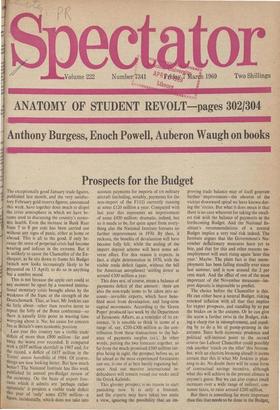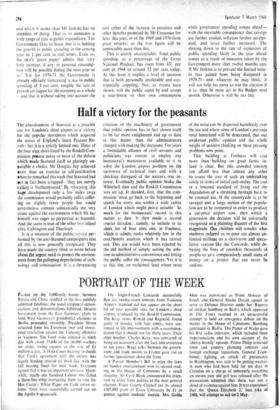Prospects for the Budget
The exceptionally good January trade figures. published last month, and the very satisfac- tory February gold reserve figures, announced this week, have together done much to dispel the crisis atmosphere in which we have be- come used to discussing the country's econo- mic health. Even the increase in Bank Rate from 7 to 8 per cent has been carried out without any signs of panic, either at home or abroad. This is all to the good, if only be- cause the sense of perpetual crisis had become wearing and tedious in the extreme. But it is unlikely to cause the Chancellor of the Ex- chequer, as he sits down to frame his Budget (which now looks increasingly likely to be presented on 15 April), to do so in anything but a sombre mood.
This is not because the apple cart could at any moment be upset by a renewed interna- tional monetary crisis brought about by the weakness of the franc or the strength of the Deutschemark. That, at least, Mr Jenkins can do little about—other than resolve never to repeat the folly of the Bonn conference—so there is equally little point in wasting time Worrying about it. No; his cause for concern lies in Britain's own economic position.
Last year this country ran a visible trade deficit of more than £800 million—far and away the worst ever recorded. It compared With a £637 million shortfall in 1967 and, for the record, a deficit of £437 million in the Tories' annus horribilis of 1964. Of course. things are now looking better. But how much better? The National Institute has this week Published its annual pre-Budget review of the economy. On the basis of export fore- casts which it admits are 'perhaps rather Optimistic' it projects a visible trade deficit this year of 'only' some £250 million—a figure, incidentally, which does not take into account payments for imports of us military aircraft (including, notably, payments for the non-import of the F111) currently running at some £120 million a year. Compared with last year this represents an improvement of some £450 million; dramatic, indeed, but so it needs to be, for quite apart from every- thing else the National Institute foresees no further improvement in 1970. By then, it reckons, the benefits of devaluation will have become fully felt; while the ending of the import deposit scheme will have some ad- verse effect. For this reason it expects, in fact, a slight deterioration in 1970, with the visible trade deficit (again, without the bill for American aeroplanes) 'settling down' at around 1300 million a year.
This does not, of course, mean a balance of payments deficit of that amount : there are also the non-trade items to be taken into ac- count—invisible exports, which have bene- fited most from devaluation, and long-term capital movements. According to the 'Green Paper' produced last week by the Department of Economic Affairs, as a reminder of its ex- istence, 'it is sensible to think in terms of a range of, say, £200-£300 million as the con- tribution from these transactions to the bal- ance of payments surplus (sic).' In other words, putting the two forecasts together, so far from the much-promised £500 million sur- plus being in sight, the prospect before us, as far ahead as the most experienced forecasters can see, is one of at best barely regaining bal- ance. And our massive international in- debtedness will remain round our necks until the Greek Kalends.
This gloomy prospect is no reason to start panicking now. It is only a forecast; and the experts may have taken too static a view, ignoring the possibility that an im- proving trade balance may of itself generate further ' improvement—the obverse of the vicious downward spiral we have known dur- ing the 'sixties. But what it does mean is that there is no case whatever for taking the small- est risk with the balance of payments in the forthcoming Budget. And the National In- stitute's recommendations of a neutral Budget implies a very real risk indeed. The Institute argues that the Government's No- vember deflationary measures have yet to bite, and that for this and other reasons un- employment will start rising again 'later this year.' Maybe. The plain fact is that unem- ployment has been falling steadily ever since last summer, and is now around the 2 per cent mark. And the effect of one of the most important of the November measures—im- port deposits is impossible to predict.
The choice before the Chancellor is this. He can either have a neutral Budget, risking renewed inflation with all that that implies for export prospects, and standing by to put the brakes on in the autumn. Or he can give the screw a further twist in the Budget, risk- ing a sharp rise in unemployment, and stand- ing by to do a bit of pump-priming in the autumn. Since both economic prudence and political self-interest point to the second course (no Labour Chancellor could possibly risk another 'touch on the tiller' this Novem- ber, with an election looming ahead) it seems certain that this is what Mr Jenkins is plan- ning to do. No doubt there will be some form of contractual savings incentive, although what this will achieve in the present climate is anyone's guess. But we can also expect small increases over a wide range of indirect, con- sumer taxes, to raise around £200 million. and which it seems clear Mr Jenkins has no intention of doing. That is, to announce a wide range of cuts in public expenditure. The Government likes to boast that it is holding the growth in public spending in the coming year to 1 per cent in real terms. Even so, the DEA'S 'green paper' admits that 'very little increase, if any, in personal consump- tion will be possible during the next year or so.' Yet for 1970-71 the Government is already officially forecasting a rise in public spending of 3 per cent, roughly the rate of growth envisaged for the economy as a whole —and that is without taking into account the cost either of the increase in pensions and other benefits promised by Mr Crossman for later this year, or of the 1969 and 1970 farm price reviews; so the true figure will be appreciably more than this.
This is utterly unacceptable. Total public spending, as a percentage of the Gross National Product, has risen from 431 per cent in 1964 to around 52 per cent today. At this level it implies a level of taxation that is both personally intolerable and eco- nomically crippling. Nor, as events have shown, will the public stand by and accept a near-freeze on their own consumption while government spending romps ahead— with the inevitable consequence that savings are further eroded, inflation further acceler- ated, and taxes further increased. The slowing down in the rate of expansion of public spending likely in the year ahead comes as a result of measures taken by the Government more than twelve months ago. If Mr Jenkins is to prevent the limited bene- fit thus gained from being dissipated in 1970-71—and, whatever he may think, it will not help his party to win the election if it is—then he must act in his Budget next month. Otherwise it will be too late.



































